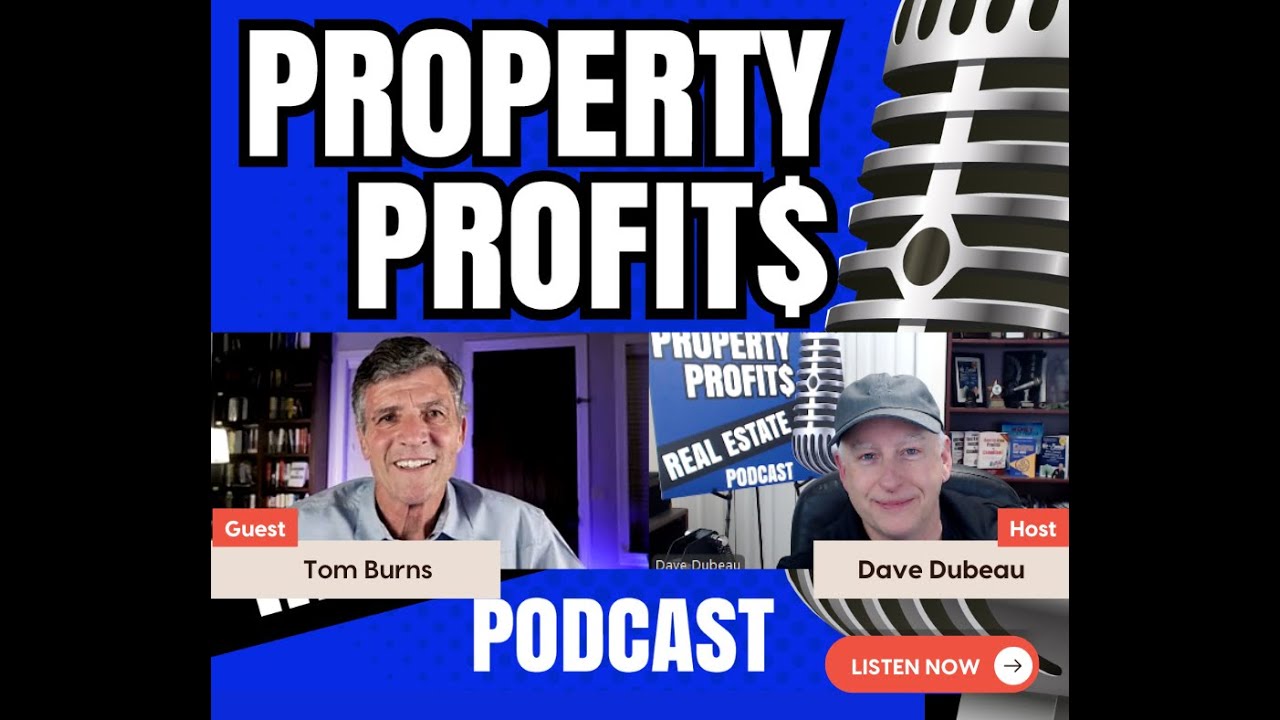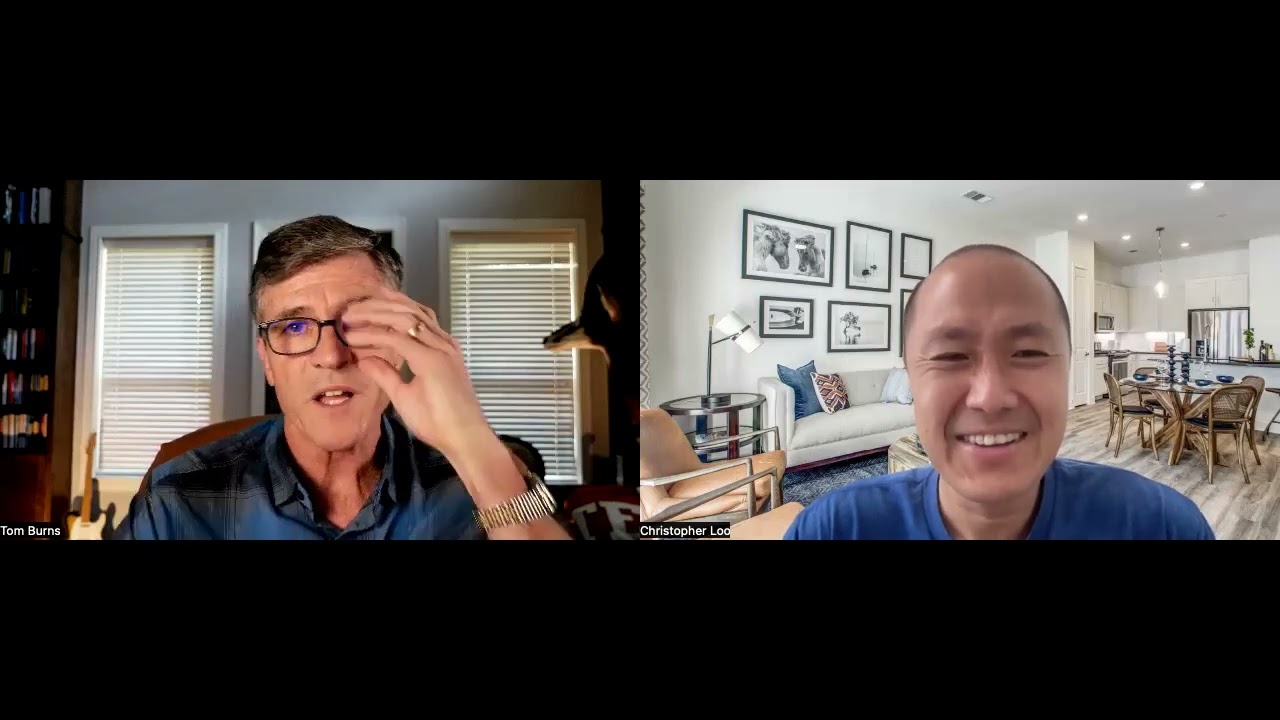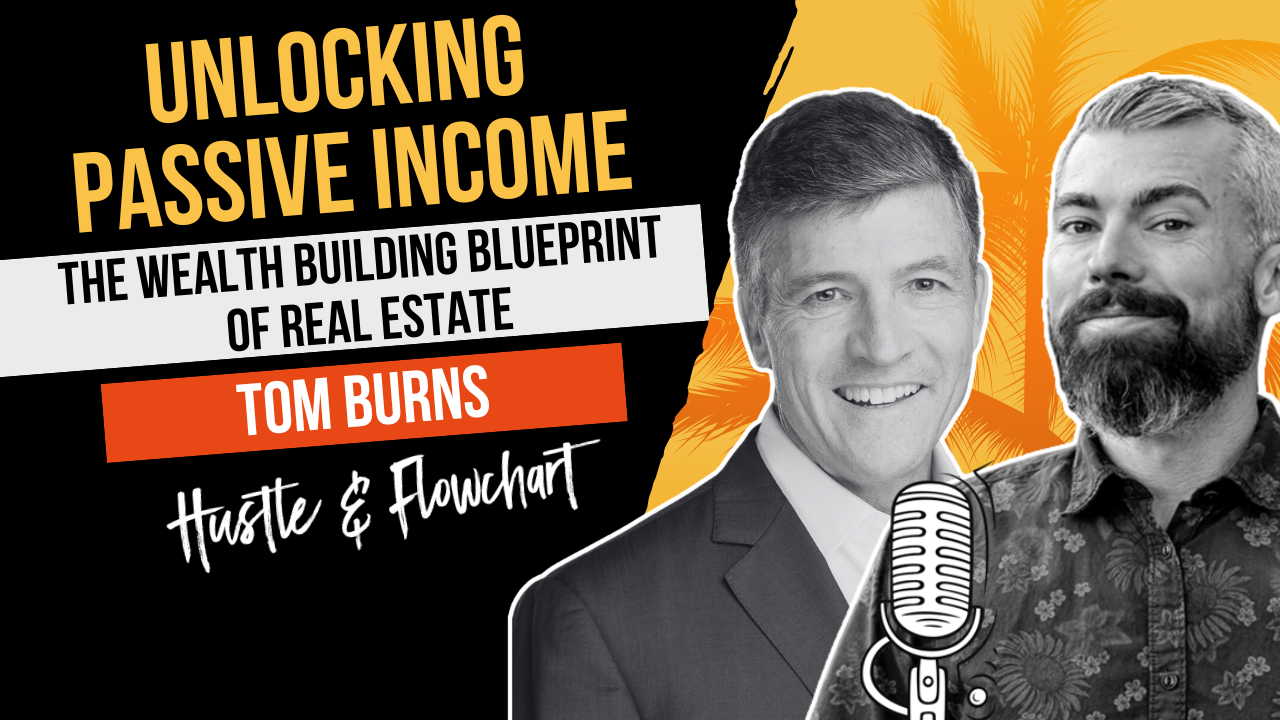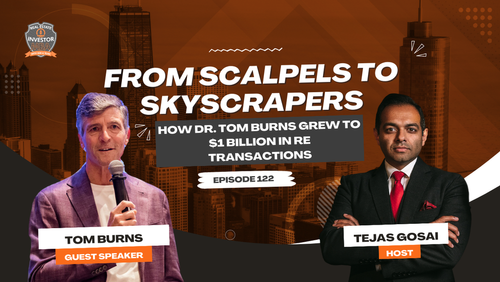
What You Will Learn in 24-Minutes:
- How to balance your work life while investing in real estate
- The importance of having a partner in real estate investing
- It’s never too late to build your passive income empire
- Tom’s risks and rewards of real estate investing right now
- How to vet a real estate deal
Full Transcripts of the Podcast:
Jeff Brainard: Hello, and welcome to the noble wealth partner’s podcast. Noble wealth partners is a registered investment advisor created to help individuals and families get more out of their relationship with their financial advisor.
From investment management to comprehensive financial planning. Joining us this week on the noble wealth partner’s podcast is the great Tom Burns from Presario ventures, down in Austin, Texas. Tom, welcome to the show.
Tom Burns: Thanks Jeff, great to be here.
Jeff B.: No, well, the pleasure is all ours; we’re happy to have you here, Tom. And this week on the show, we want to discuss real estate investment, and specifically, we want us to talk about private commercial real estate investment, one of Tom’s specialties. He has about 25 years of experience in that space.
And Tom, I was hoping maybe before we get into the deep dive on commercial real estate, you have such an incredibly unique background. I was wondering if you could give the audience a little bit of information about who you are professionally, where you came from, how you got to where you are today, and a little bit of information about Presario ventures if you would. That would be really helpful.
Tom B.: You bet. Not the typical real estate path. I started life as an athlete that wasn’t going to make any money doing that, so I ended up going into medicine. So I went to medical school and did not have the benefit of any business classes or anything. I was loving medicine, going through my training. After the end of my training, and quite honestly, I started seeing the people that I was going to emulate in the future, seeing what they did, the other doctors.
They were making quite a good income, but they were complaining a bit about their time and things like that. And being controlled by other people such as insurance companies and entities like that. So I thought that maybe it might be a little smarter to maybe have some income that wasn’t correlated to the medical world. So I started searching, and my first contact was actually with a financial planner group that came in and talked to us about money.
And it just gave me an idea of how money worked, and how you didn’t necessarily have to perform services all the time to get income. So I started searching, finding some things that would work. And that’s how I eventually gravitated towards real estate. Real estate is a bit slower; there are trends, there up and downtrends, but they move slowly, and you don’t have to be the first one in.
So that fits my lifestyle as a busy doctor. I found out I could do it with partners, or without, I could do it part-time, and so it fits well for me. We are in Texas, eventually came back and was practicing full-time and sort of going along learning this real estate business, started small like most people do. Little buildings here and there, little things, learned a lot. And what happens is when you get into an industry, you start getting knowledgeable, you start getting familiar with the industry, you start developing some degree of expertise.
And those that have other degrees of expertise in that industry start noticing you, and you start partnering up, and you start learning. So that’s kind of what happened. I did my smaller deals; they became larger, you start adding zeros to deals, you start meeting people. And quite honestly, at one point, I went to a person that I knew who was very successful in the real estate world. I said I like what you do; I would like to learn.
And so as a full-time practicing physician, I worked for three years for a real estate guy for free. We did land deals and built two suits and things like that, but I learned a lot. That eventually morphed into a hundred and fifty thousand square foot medical office building. So good things come when you work hard. So that was one partner who I learned a lot from. I then was speaking at a real estate conference in the early 2000s, met somebody in the audience from the West Coast, they were moving to Austin, Texas, where I live.
And we got to know each other, and after about 6 or 7 years we became partners. Our first really large deal was in 2010, we did a 240 unit apartment complex, and that was a company that was named differently. It was RNV Capital Partners, and that was sort of the seed for Presario ventures, that’s where the story ends. We pivoted our strategy, rebranded the company about three years ago. We are now Presario ventures, and we focus on commercial real estate, primarily in the multifamily class-A apartment space.
Jeff B.: Terrific, and thank you, Tom. And I want to expand on that a little bit because not only are you a very successful real estate investor, but you also happen to be an orthopedic surgeon, which I find absolutely fascinating. I won’t pretend to be a doctor, but I will say that I understand that being a doctor and especially an orthopedic surgeon requires a lot of expertise and takes some time, correct?
So I would like to see if you could talk about those two different disciplines, the skills and the expertise that are required by both. And what those two do to complement each other and allow you to be successful in both.
Tom B.: You bet. It has been relatively life-changing, you know at first I wanted just a little bit of extra income. I wanted income that would give me some freedom and choice, as to how to manage my life and do the things that I wanted to do as I moved down that path of life. And so along the path eventually the income started increasing, I started finding I didn’t have to work as much as an orthopedic surgeon. And in any job that you do, you like to have some choices.
So on the good side from the orthopedic world, I was able to eliminate a lot of those stressors. And I’ll tell you that 54% of the doctors in the country have suffered some symptoms of burnout, which means that every other doctor you see at one point in his life or her life didn’t want to be there. So I don’t suffer that right now because I’ve developed enough income outside of medicine, that I can do it as more of a passion rather than a necessity to feed my family.
So that has been the biggest benefit. It has changed probably the lives of my patients and me. I love going in; they say if you’re looking forward till Friday, you don’t really like your job; I love going in on Mondays. So it has been a blessing to me, to my patients, to my staff, and that’s why I’m still practicing. I am not dependent on my orthopedic physician income, yet I still practice be because I truly enjoy it. On the real estate side, it’s because of the ability to do it part-time or full-time that is a big thing and the ability to use partners. You know I’ve had two primary partners; they’re both very smart gentlemen.
They’ve taught me a lot, and maybe they’ve learned a thing or two from me, but we work well together. So it doesn’t all have to be you, so that’s been the big benefit of using real estate as that vehicle. And I love real estate as well; it’s a way to help people just like medicine is.
Jeff B.: Yes, absolutely. I mean obviously in different ways, but definitely in two different ways where you can add value to people’s lives, and I think that that’s pretty terrific. And it also rolls nicely into the next question I wanted to ask you, and that was in regards to when you developed an interest in real estate.
Was it something that you found a passion for early in life? Was it something that you started to get interested in college? Or was it something that you sort of developed an interest in as you got going in your professional career as an opportunity to, as you mentioned earlier, diversify your income?
Tom B.: I think it happened in my training. I was always entrepreneurial early, been working since I was 13. So I always kind of wanted my own money, so to speak. But then going through that, once I found out I wasn’t going to be a star athlete, you start going through that medical world it’s a long road. It’s ten years after college, so we go to school longer than is reasonable.
Jeff B.: I think that’s fair.
Tom B.: But that’s how we learn how to do what we do. So it really was more of that realization of watching people that were ”successful” in the profession that I was about to start in, and they weren’t happy. And my view of life was that you were supposed to be happy with what you did. So I would say it came later, and I looked at a number of other things, and real estate just seemed to be the thing that fit that lifestyle best for me.
Jeff B.: Interesting. So later in the career, which I think is a really good lesson for our listeners on your opportunities to try different things at any point in where you happen to be in your career right now. Looking for other options, side hustles whatever that might be.
Also, Tom, I think I’d be remiss if I didn’t address one question, and that was about your aspirations as an amateur athlete. And I was wondering, I happen to coach youth baseball and high school baseball here in the Denver suburbs in Colorado. But if you wouldn’t mind talking a little bit about how that transpired for you and the athletics in general, where that led you.
Tom B.: Oh, yes, I don’t want to think I was better than I really was. You know I was a baseball player, and then picked up early, and then I picked up a tennis racket, and that seemed to be where my talents were best suited. So I became a tennis player, did reasonably well and was good in my lane, so to speak. But I was never going to be on anybody’s TV with them watching me play tennis.
Jeff B.: No, well, maybe not on TV. But I do know that Grant, my business partner, whom I know you know very well. Both from a family perspective and a professional perspective also happens to play tennis or at least pretend to play tennis. So maybe one of these days, we could get that particular match on a television set for some of our loyal listeners.
Tom B.: Well, I can make it public now; I don’t think I can beat Grant anymore.
Jeff B.: Good, we’ll make that public announcement. So back to the real estate discussion, you obviously have a lot of contacts and relationships in the real estate space. You spend time with a lot of data sets reviewing and analyzing that particular data, looking for opportunities in real estate for investment ideas.
I was wondering if you could spend a little time talking about where you see the biggest opportunities, or the biggest challenges right now in real estate investing. And it doesn’t have to be limited to Austin, Texas; it could be anywhere in the country, any sector. Talking residential, commercial, industrial whatever it happens to be. But what are the biggest opportunities and challenges you see right now in real estate investing?
Tom B.: You bet, I’ll start with the good because there’s always good and bad to everything. On the good side, everybody always still needs a place to lay their head or to do business or to store their stuff. So Real Estate’s been around for 5000 years, there’s always a need for it. And just recently, the Dallas Fed just came out with a new statistic that the state of Texas at least is going to have job growth of one and a half percent over this next year, that’s still pretty good.
On the downside, we have had a run of eight to ten years of just fantastic real estate appreciation and growth. And so you could throw a dart at a piece of real estate and probably come out ahead. So it’s a long run, as we all know life is waves the same thing happens in the financial markets. Eventually, there’s some sort of correction. So we’re sort of near top prices are high, and so some care needs to be taken when choosing the type of real estate you want to use.
That being said, there’s always the deal of the century right around the corner if you know where to look. So I think with the corporate debt that’s going on right now, you know if there’s an uptick in interest rates or a downturn in the market that could affect some of the larger corporations which in turn could affect jobs, and there may be layoffs. Real estate, or at least the real estate that we live in and the commercial multifamily real estate, we follow jobs.
And so we try to stay in high job growth markets, which does put us in Texas, that’s where Presario does most of its work. There are plenty of other pockets; there’s certainly Florida’s a high job growth State, prices are less in the Midwest, and values are crazy in San Francisco, New York. It just depends on what your expertise is because that’s another point is you don’t just do real estate.
Real estate is not a thing you do, there are multiple types that you can do, and they all have their different areas geographically and their different time periods that work. So it’s the top of the market right now, so it’s time to be careful.
Jeff B.: Yes. I think that’s reasonable, and I think you bring up a really good point about the different sectors of the real estate investment market. And I know that you and the team at Presario Ventures focus on commercial and primarily multifamily commercial.
But if you wouldn’t mind for the audience, just helping them conceptualize the different sectors of the real estate marketplace, and which sectors they should be paying attention to and how they can break that down for their own education.
Jeff B.: Well, you first need to look at what’s it like. I mean, we have our work, and then we have our passion, so hopefully, you find something that you really are excited about. Maybe you don’t like warehouses, but you like single-family homes. So that’s the first thing, find something that you enjoy researching, and then research. I hate to say that word, but you need to learn.
Because buying single-family homes in Memphis, Tennessee, might make a lot more sense than trying to buy single-family homes in Austin, Texas. Likewise, maybe it’s a little better to do multifamily in Austin versus Memphis. It all depends. The real estate is very local. So I can’t tell you that self-storage or industrial or hospitality and hotels is any better than multifamily versus commercial office, and they all have so many subsets, there’s commercial medical.
So some sectors that are maybe a little recession-proof, we are in multifamily for that very reason. Multifamily does well when there’s a downturn, does reasonably well when there’s a downturn. Sometimes office space goes dark in large chunks; self-storage can do reasonably well because if people get laid off, maybe they move to a smaller place they have to store their stuff.
Mobile homes manufactured housing that tends to do well. Right now, industrial is sort of the hotter property; rental rates are rising a little higher than industrial property. But even in the multifamily world, we have to build four million apartments between now and the year 2030, so that’s 11 years to build 4 million apartments. They built three hundred and nineteen thousand last year, and it was a record. So we are actually not keeping up with demand, but again that demands local, just depends on where they’re being built.
Jeff B.: Yes. What we hear a lot, especially here in Denver in our locale here with our clients. Is that they want to invest in real estate, and they’ve done a little bit of research, and what they’ve discovered is that things are extremely expensive. And I think Denver is not the only place that has that particular issue, and it kind of extends around to different pockets of the country.
But what makes me nervous is when our clients come to us and say, I’ve done a little bit of research on real estate investing. I think it’s really expensive, so my gut tells me I need to go somewhere where the price is lower. Now the problem is well the price might be lower, they haven’t done any research.
They’re just making a decision based on the fact that Denver has simply priced them out of the market, and they’re going to try to find another opportunity. Without spending enough time there, or without having any real expertise whatsoever. So I was wondering if you can talk about what should investors be looking for in a real estate investment partnership, something like Presario ventures, not something from our perspective as a financial advisor.
Tom B.: You know relationship, just as in your business and financial planning, both real estate financial planning their relationship businesses. So you need to know the people that are the sponsors, or that are maybe showing you the investment. Nice to look at their track, look at their track record. Look at their information and the transparency that you’re getting from them.
So that’s one thing you need to know the people. And again, there’s no substitute for knowing your market; it helps to learn a little bit. Don’t expect somebody to be a real estate expert if that’s not their passion. So that kind of leads back to knowing, liking, and trusting the people that you work with. Real estate’s not an emotional business; it’s all numbers. And so don’t get emotionally tied to something because it’s pretty, the numbers don’t lie. So look at the numbers.
One mistake that I made when I was younger was that, in fact, quick story. I had an investment with a guy that I didn’t know but had been referred to me by somebody else. Had a good track record, and I sent it to a third person to look at that I trusted that knew real estate.
And he didn’t like some aspects of the deal, but I was young and, of course, smarter than my advisor, and I did the deal. And lo and behold, he turned out to be right. So that’s one of my rules, is I will find somebody that been there before I’ve been there. And if they give me advice that is contrary to what I’m thinking, I will follow their advice.
Jeff B.: Yes, outstanding. I think that that’s probably good advice when it comes to anything in the investment world. Always be willing to listen to a contrary opinion. Talking a little bit about the mechanics of actually investing in private real estate Tom, if you wouldn’t mind spending a little bit of time on we had a listener who wanted to get into the space.
They not necessarily looking to purchase another house and become a landlord or go down that route. But they were looking for an alternative to traditional investments, and they were looking for some passive income ideas. Where would you steer them?
Tom B.: You betcha. And yes, you can do it two ways. You can do it actively and buy your own rental house or duplex, or you can be involved in syndications. Where there’s a main general partner who’s a sponsor of a project, and they are gathering money from others in a syndication to provide the equity or the money for the project. Look social media, hate to say the word, but social media there are groups out there, there are Facebook groups.
You type in real estate, you will find lots of Facebook groups, and there are people on there that have got opinions from A to Z, you’ll learn a lot there. Through those Facebook groups often, there are meetups, live meetups where you can go in your town to meet people that are in the real estate world. And that will fit with what you want to do. It might be single-family home folks; it might be multifamily or office.
So get around people that are doing it that will get you in the environment, you will learn by osmosis and by effort. And so that’s the first thing I would do. People do come to me a lot and say, hey, I’m ready get into real estate what should I do? And my first answer is get educated, absolutely.
So read some, there are some books out there to read, and I would read some books, I would go talk to some people. You will find more resources; after a while, you’ll find out that you know a lot more about the industry, and you’ll know which way you want to go.
Jeff B.: Yes, I think that makes a lot of sense, Tom. And I think the most important thing you mentioned is that in any sort of investment business, it is a relationship business. And I don’t think you can sit at your computer and simply do a little research on the internet, or throw a dart at a particular project that comes your way or across your desk and assume it’s a good deal without knowing the people that are behind that.
So I really like the idea of social media, which I know carries some bad implications with it, potential fake news, whatever else that’s going to be out there in the social media world. But I think it’s nice to be able to affiliate yourself with a group of people that are experts, and that are willing to give you some advice and help educate you. So really good stuff there. Last question of the day here, Tom, and we’ll get to this one pretty quickly. I filled you in on this before you came on the show, but we would like to refer to this one as my friend Matt’s question.
So essentially, a little background on this is Matt is a real person; he is a friend of mine from high school. Last year around Thanksgiving time, I was getting together with some friends around the fire, had a few cocktails, and my friend Matt posed this question to me. He said, what in this world of professional finance, what do you guys know that you’re not telling the rest of us?
And that you’re using to take advantage of us? So with all of our guests, we like to have a chat with them about my friend Matt’s question. And we won’t go into the world of medicine with you on this one Tom, but if you can just sort of focus it on real estate investing. What do the folks in the real estate investment world, the professionals like yourself? What do you know that you’re not telling the rest of the world?
Tom B.: All right. Well, if your listeners won’t let the cat out of the bag, I’ll let them know. The primary secret is that those of us that have been in real estate for 20 and 25 years are no smarter than you are. As I looked at this, I got a music metaphor. So music is made up of only 12 notes, and it just depends on how you arrange the notes as to how it sounds. And so some of the greatest songs ever played were made out of three and four chords, very simple music.
So Tom Petty song you can play with three chords. So if you’ve got knowledge of music you can stand up on stage, play those three chords and those in the audience if they don’t understand music, they think you’re awesome, so you’re a rock star. Same drill in the real estate world. I’ve got another friend who says, do the numbers, and the numbers will tell you what to do. Real estate is not an emotional game; it’s just basic numbers; it’s basic math.
So we just do the math, and we do the research. We’re just nerdy enough to have all the services that give us all that data; we crunch data, we use a lot of spreadsheets. So no great secret from our end, the big secret is truly educate yourself. You got to learn, and you’ll find what you like. And get educated, find some people that know what they’re doing, and before you know it, you’ll be in an environment where you’re learning all the time. You’re finding people you know, like, and trust; then, you’ll be able to pick where to get your passive income and get the investments that you’d like to participate in.
Jeff B.: I think that’s fantastic, thank you, Tom. Tell our guests, tell our audience where they can find more information about you, how they could get ahold of you if they’d like to, and more information about Presario ventures in Austin, Texas.
Tom B.: You bet. The website for Presario is www.Presarioventures.com, and I’m Tom@Presarioventures.com.
Jeff B.: Fantastic. So if we have any of our clients or any of our audience members that would like to ask you a question, hopefully, you don’t mind Tom if they shoot you an email.
Tom B.: No, that’s part of our deal, we’re founded on education, and we have educational events all the time. So I always encourage people to call us. We’re still pretty small enough that my partner and I always talk to our investors live. So have them call me, I’ll be happy to answer questions.
Jeff B.: Well, you’re so gracious with your time. Tom, so thank you very much. And from our audience, and from all of us at noble wealth partners, thank you for joining us this week. I know we don’t have you forever, I know you have this little job on the side where you’re an orthopedic surgeon.
So who knows we may need to be letting you get on with your day. Hopefully, we can have you on again down the road sometime, but we really appreciate your time this week on the noble wealth partner’s podcast.
Tom B.: All right, thanks, Jeff, appreciate it.
Outro: Thank you for listening to today’s podcast. As a reminder, everything discussed in today’s podcast is not intended to be investment advice or tax advice to any specific circumstance.
And we would recommend that you speak to a tax professional or your investment professional about any questions that you might have related to your own situation. Noble wealth partners is not liable for any ambiguous or incorrect information that was mentioned in today’s podcast.
[End of Recorded Material]







